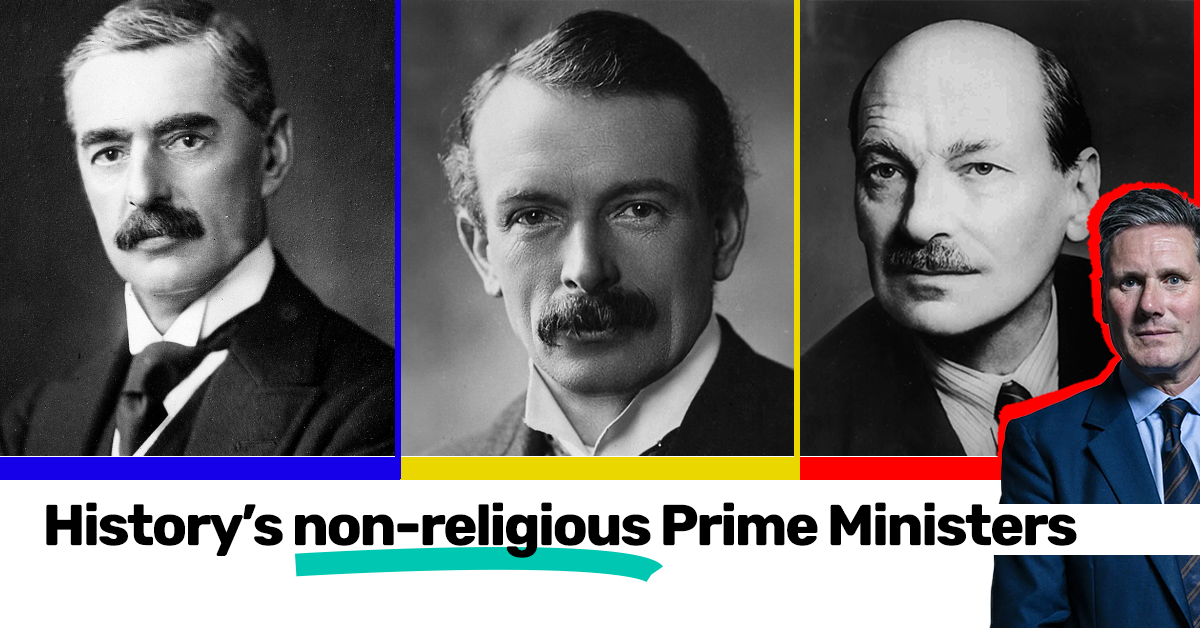
In the run-up to the general election, several newspapers published stories saying that Keir Starmer would be the UK’s ‘first atheist Prime Minister’ – but as Humanists UK pointed out at the time, that simply was not true! As a non-religious person with a belief in ‘irreducible human dignity’ (as he put it to a recent biographer), Sir Keir is only the latest in a long line of non-religious and humanist heads of government in the UK.
Unlike in the United States, where not believing in gods has often been (or been treated as) an insurmountable barrier to being elected, it has not been an issue in the UK in the twentieth or twenty-first centuries. This probably reflects the fact that most voters, who are after all not religious themselves, don’t care about the religion of their politicians when choosing who to vote for. But that doesn’t mean that we shouldn’t celebrate the fact that we live in a country where there have been non-religious Prime Ministers – many of them!
Labour Prime Ministers are particularly likely to be non-religious – four of seven have been – but there have also been non-religious Conservative and Liberal PMs. Here we provide a brief run-through of them all, plus a few other big names in UK political history who were self-described humanists, atheists, agnostics, or non-believers.
The Prime Ministers
Ramsay MacDonald (Labour Prime Minister, 1929-1935)
Prior to becoming the first ever Labour Prime Minister in 1929, Ramsay MacDonald was the Chair (sometimes ‘President’) of Humanists UK, in 1902 and 1904. Although sometimes remembered, even by biographers, for his early religiosity, MacDonald’s views changed significantly with age – starting off strict Calvinist, then Church of Scotland, before later giving sermons that were non-committal about the existence of god as a Unitarian, and then being drawn into the British Ethical Culture movement and the London Ethical Societies that together merged to become today’s Humanists UK.
As a member of Humanists UK, he chaired meetings that initiated Humanists UK’s faith schools campaign, wrote for and helped to edit the humanist magazine Ethical World, and was a co-founder of the Society of Ethical Propagandists, which worked to advance the idea that ‘a good life is desirable for its own sake, and rests upon no supernatural sanction’ and ‘a good individual life can only be attained in a good society.‘
MacDonald was the first ever Prime Minister to make a secular affirmation rather than swear a religious oath upon taking his seat in Parliament. Although a controversial figure for making political compromises and forced to implement austerity measures once in office, MacDonald is significant in history for being one of the earliest examples of an explicitly humanist Prime Minister. The fact that this is often left out of histories is a great example of a pattern in historical writing that the Humanist Heritage project was set up to challenge and redress.
David Lloyd George (Liberal Prime Minister, 1916-1922)
Although strongly associated with Nonconformists in Wales due to his cultural background, political sympathies, and chapel-going, David Lloyd George experienced a total loss of religious faith in his teenage years. He was later described by biographer Don Creiger as a ‘deist… and perhaps an agnostic’. A monumental figure in UK history, Lloyd George led the country during the First World War and helped to invent the ‘welfare state’ as we know it today.
A native Welsh speaker, he holds a special place in humanist history for his role in the disestablishment of the Church of England in Wales, which reflected very strong demands for religious pluralism and freedom from having Anglican Christianity imposed by official institutions. As the Wales Humanists report on 100 Years of Disestablishment details, this began a long process of twinned secularisation and devolution in Wales, culminating in the secular and inclusive values of today’s Senedd.
Neville Chamberlain (Conservative Prime Minister, 1937-1940)
Neville Chamberlain was raised in a non-theist Unitarian – and later atheist – household. Chamberlain claimed to have neither practised nor showed interest in religion at any age. When pressed, he described himself as a ‘reverent agnostic’. His declaration of war on Germany in 1939 marked the beginning of the Second World War. Succeeded by a challenger from his own party, he nevertheless served in Churchill’s War Cabinet until forced to resign by ill health.
Winston Churchill (Conservative Prime Minister, 1940-1945 & 1951–1955)
Originally a political outsider who challenged his own party from the sidelines, Winston Churchill eventually came to power as Prime Minister early into World War II, for which he is best remembered. After losing to his Labour rival Clement Attlee in 1945, he served as Prime Minister a second time after a rematch election with Attlee in 1951. Sometimes rated the ‘greatest Briton’ in polls, historians have also been deeply critical of Churchill, particularly for exacerbating the Bengal famine and for his numerous racist speeches and writings whose language dehumanised non-European peoples around the world.
Churchill was an agnostic atheist whose writings to friends evinced a deep personal dislike of Christianity. In one letter he said ‘I do not accept the Christian or any other form of religious belief.’ In common with the German communist philosopher Karl Marx, he likened religion to a drug, calling it a ‘dangerous narcotic’. He was no secularist, saying of the state Anglican church that he ‘supported it from the outside’. When contemplating his death, he told his doctor he ‘did not believe in another world’, only ‘“black velvet” – eternal sleep.’
Clement Attlee (Labour Prime Minister, 1945-1951)
Clement Attlee was a politician whose socialist and humanist values underpinned a commitment to implementing sweeping reforms in social welfare. Described by historian R.C. Whiting as an ‘unobtrusive atheist,’ Attlee believed in ‘ethics’ without ‘mumbo-jumbo’, and earned a reputation as a principled, decisive, yet modest politician. He had many friends and colleagues who were active in the Union of Ethical Societies (now Humanists UK), including Lord (Harry) Snell, who Attlee described as ‘a great citizen of the world and a very great gentleman’.
James Callaghan (Labour Prime Minister, 1976-1979)
The only person in history to have ever held all four Great Offices of State was James Callaghan. Raised by an Irish Catholic father and a Baptist mother, Callaghan cut his political teeth in the Welsh Labour Party through the trade union movement, where as a teenager he experienced a complete break with religion. He successfully campaigned for the ‘Yes’ vote in the 1975 referendum which took the UK into the European Communities (later known as the European Union) but suffered defeat in the 1979 referendum on devolving political power to Scotland. His ideas on devolution would ultimately be put in place 20 years later by the Blair government. He lost office due to a combination of the referendum loss and the so-called Winter of Discontent caused by disruptive trade union strikes.
Other humanist politicians who changed the UK
Nye Bevan
‘He was a great humanist whose religion lay in loving his fellow men and trying to serve them,‘ said Jennie Lee MP of her husband, Nye Bevan. In many ways, Bevan’s fearsome advocacy of the creation of a National Health Service in the UK (which happened when he was Minister of Health) reflected his personal values as a humanist – someone who believed this life was the only life we have.
Jennie Lee
Like her husband Nye Bevan, Jennie Lee was a humanist and a supporter of the British Ethical Union (later Humanists UK). Her many achievements as Minister for the Arts included founding a ‘university of the air’ – today’s Open University – and increasing government funding for the arts, which she saw as critical not just for cultural enrichment and the UK’s soft power, but as a tool to lift people out of poverty.
Leo Abse
A founding member of the All-Party Parliamentary Humanist Group, backbench MP Leo Abse initiated and was the face of the successful private member’s bill to decriminalise homosexuality in England and Wales in 1967 – which made him a personal target for tabloids and vicious homophobia in society, including from the established church. He had a successful second Private Member’s Bill with the Children’s Act in 1975, which reformed and improved fostering and adoption by legally obliging courts and adoption agencies to promote child welfare. He also courageously moved forward staid political debates about IVF to help more women start families.
Roy Jenkins
A humanist in his private beliefs, Labour Home Secretary Roy Jenkins is usually credited with allowing time for bills to decriminalise abortion and homosexuality to pass through the Commons, as well as with the abolition of the death penalty in the same era. Prior to the 2024 election, new Prime Minister Keir Starmer made a similar promise to Esther Rantzen to allow a private member’s bill on assisted dying the time to become law if supported by MPs in a free vote.
Eric Avebury
A hereditary peer who supported the abolition of hereditary peers, Lib Dem stalwart Lord Eric Avebury should be credited with a major achievement: the abolition of blasphemy law in England and Wales, and with it, the introduction of a specific legal clause guarantees freedom of speech for criticism of religion. Working with Humanists UK and his humanist colleague Dr Evan Harris MP, he helped get the ball rolling on a global campaign for the same end. He reconciled his humanist outlook on life with strong Buddhist sympathies, living as a ‘secular Buddhist’.
Avebury’s drafting of airtight free speech protections for humanist views was later inserted into the Scottish Hate Crime Bill, after a fierce campaign to abolish blasphemy laws and protect free speech from Humanist Society Scotland and Humanists UK.
John Stuart Mill
Briefly the MP for Westminster from 1865 to 1868, John Stuart Mill was the first MP to advocate for votes for women. But it was Mill’s work outside politics, as ‘the most influential English-speaking philosopher of the 19th century’ (Stanford Encyclopedia of Philosophy) that truly changed the world. Influenced by his friend Jeremy Bentham, who promoted the philosophy of utilitarianism for creating ‘the greatest happiness to the greatest number’, Mill’s ideas influenced political and social reforms around the world, shaping the course of modern democracies. Through writings such as On Liberty and The Subjection of Women (co-developed with his wife Harriet), Mill shaped the philosophy of liberalism as it is today and helped to crystallise modern-day humanist thinking on social issues and human rights.
So great was Mill’s influence on 20th century politics that Prime Minister H. H. Asquith once said that ‘During the first twenty-five years of the Queen’s reign, Utilitarianism… was the ‘philosophy in office’.
William Beveridge
A rare example on this list of a second-generation humanist, economist and social reformer, William Beveridge was the son of a Unitarian mother and a ‘positivist’ father, who had been an activist for Auguste Comte’s ‘religion of humanity’ when those ideas were shaping the development of humanist societies in the UK. He described himself as a ‘materialist agnostic’. He was briefly the MP for Berwick-upon-Tweed from 1944 to 1945, elected for the Liberal Party in the dying days of Churchill’s first Government, before becoming a life peer the following year. But it was earlier in his career as the author of the 1942 report Social Insurance and Allied Services that Beveridge fundamentally changed the course of history and helped to shape the postwar consensus of British politics. Influenced by his humanist values and upbringing, and ideas of ‘positive liberalism’, his report laid the intellectual blueprint for the British ‘welfare state’, including a National Health Service, that was later put in place by Attlee’s Government.
Lord (Bertrand) Russell
No list of great humanists would be complete without Lord Russell, who from the House of Lords was a frequent and vocal champion of humanist causes, and who used his platform on the airwaves and behind the scenes to promote humanist ideas in the BBC and popular culture. His timeless advice? ‘Love is wise, hatred is foolish.’
Rhodri Morgan
A patron of Humanists UK, this ‘father of Welsh devolution’ as First Minister of Wales helped to shape Wales’ exemplary, secular, civic culture – which Wales Humanists celebrated in its report 100 Years of Disestablishment. He made history again when he died by having the world’s first public funeral led by a humanist celebrant.
Like Rhodri, his widow Julie Morgan is a patron of Wales Humanists and Humanists UK. To this day she is an active Member of the Senedd in Wales and has held numerous senior briefs for the Welsh Government.
Donald Dewar
The first ever Scottish First Minister from 1999, Donald Dewar much like Rhodri Morgan helped to oversee the creation of a distinctive political culture that used Westminster as a negative example of how things ought to be done. In the first ever debate in the Scottish Parliament, he helped steer MSPs away from simply recreating the Westminster Parliament’s discriminatory prayers system. In the debate, he said was conscious of the large presence of humanists in Scotland and insisted on a system that would be proportionately inclusive of non-religious Scots. His example is now cited by Humanists UK as a preferred model for the UK Parliament. Though his atheism was widely acknowledged, his quiet, non-interfering, practical secularism was also credited by religious leaders for enabling them to do more good in society, too. His tenure as First Minister was cut short by his death in 2000.
And many more
The UK’s All-Party Parliamentary Humanist Group had over 115 members at the dissolution of the last Parliament. It was founded by David Pollock and significant peers and MPs like Leo Abse, Bessie Braddock, and Lord Raglan to promote humanist and secularist ideas in Parliament. Its members included significant leaders of political parties, spanning from left-wing Labour leaders like ‘resolute humanist’ Michael Foot right through to Margaret Thatcher’s deputy chief whip Tristan Garel-Jones on the right of the spectrum.
We are aware that the list we have presented of humanist politicians is dominated by men. That reflects the unfortunate reality that most MPs in history have been men.
Is the UK changing? (Spoilers: yes.)
As we’ve demonstrated above, Sir Keir Starmer certainly isn’t the first non-religious Prime Minister in history and he’s unlikely to be the last. The fact that the UK had non-religious prime ministers when the population was overwhelmingly Christian is in some ways surprising. But nowadays most British adults say they belong to no religion and so it may be that political figures being non-religious becomes ever more common. For example, the All-Party Parliamentary Humanist Group more than doubled in size from 2010 to 2024.
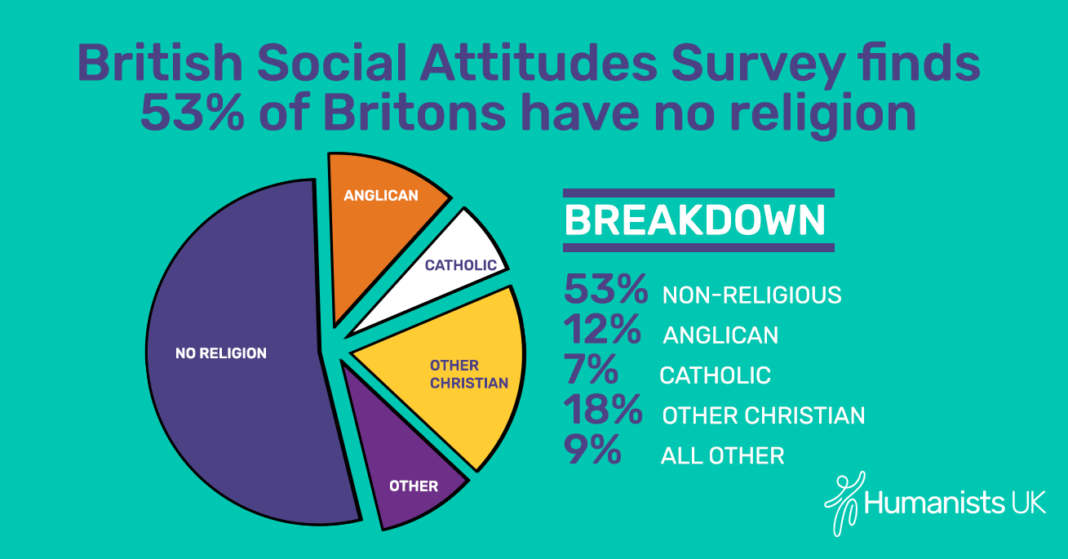
As the religious population of the UK is becoming more diverse, political representation is becoming more varied and diverse where once it was not – and that should be seen as a good thing for people from all religions and beliefs. For example, Rishi Sunak’s appointment as Prime Minister in 2022 marked the first time in history that a Christian did not hold any of the most senior roles in UK politics – Prime Minister of the UK, or First Minister of Scotland, Wales, or Northern Ireland.
Values and leadership
What’s more important to us than what a politician believes, however, is how they choose to govern. As humanists we would never claim to hold a monopoly on good values and we know many in religious communities share some essential values with us.
Whatever their convictions, what matters most is that politicians know to separate their personal beliefs from how they choose to govern for society as a whole – and that they don’t practise or endorse favouritism towards any particular religion or belief.
This approach is called ‘secularism’. Secularists can be of any religion or belief. For example, the current Leader of the Liberal Democrats, Sir Ed Davey, is both a Christian and a secularist, while the Green MP for Brighton Pavilion, Sian Berry, is a humanist and a secularist. When this is practised by governments or countries, it’s called ‘state secularism’ – sometimes referred to as the separation of church and state.
On this front, the UK has a long way to go. Despite having one of the least religious populations of any country in the world, the UK is far from secular in an institutional sense – with things like an established church, faith schools, and even bishops voting in the House of Lords. Here, Humanists UK is actively working towards positive social change.
We want to live in a world where everyone has freedom of thought, choice, and expression over their own lives, and where everyone is treated equally, whatever their religious or non-religious views may be. If that is an approach you want to support, why not join us to support our work?
Notes
For further comment or information, media should contact Humanists UK Director of Public Affairs and Policy Richy Thompson at press@humanists.uk or phone 0203 675 0959.
Humanists UK is the national charity working on behalf of non-religious people. Powered by over 120,000 members and supporters, we advance free thinking and promote humanism to create a tolerant society where rational thinking and kindness prevail. We provide ceremonies, pastoral care, education, and support services benefitting over a million people every year and our campaigns advance humanist thinking on ethical issues, human rights, and equal treatment for all.
Reports of the All-Party Parliamentary Humanist Group
Humanists UK is secretariat to the All-Party Parliamentary Humanist Group (APPHG), a group of MPs and peers who meet to discuss humanist issues and support many of the same causes we do. We provide administrative support and policy expertise to the group’s own research work. Some of the APPHG’s published reports are collected below.
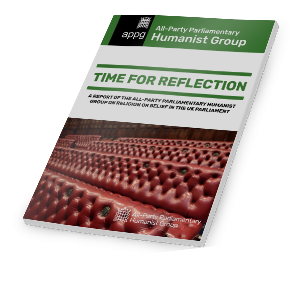
Time for Reflection
The All-Party Parliamentary Humanist Group examined the treatment of religion or belief in the UK Parliament, including practices like appointing bishops to the House of Lords and use of ‘prayer cards’.
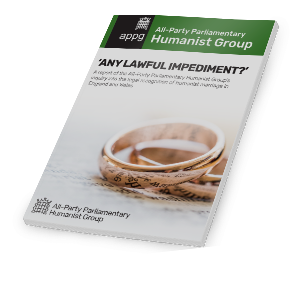
Any Lawful Impediment?
The All-Party Parliamentary Humanist Group published this report on its inquiry into delays legalising humanist marriage in England and Wales.
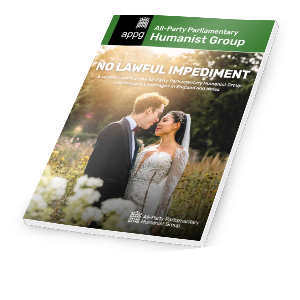
No Lawful Impediment
An examination of the case for legal marriage reform, including humanist marriages, in light of the then-ongoing Law Commission review of domestic marriage law .
